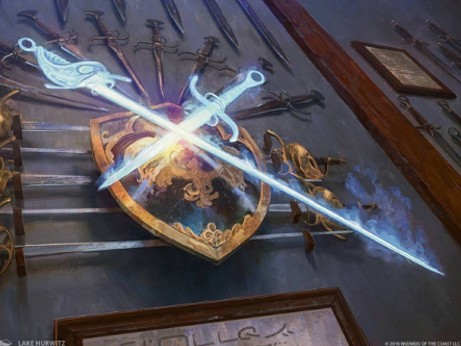Did you know that playing very fair cards can actually increase your chance of winning multiplayer Commander games? It's true! Or should I say, truel!
Game theory is a huge math-y subject that influences economics and all kinds of stuff. One of the imagined scenarios applies quite nicely to multiplayer Commander. The Truel! First of all, what a dumb name, but it's a duel with three people. I suppose if there was a four-person contest, it'd be called a quuel. All the way up to doedecaduels and beyond! But, besides being a really fun word, it's a neat thing to consider.
The classic game theory example involves so many mathematical percentages and stipulations, but the general theory is as follows: Three people, each armed with a pistol, set out to be the last person standing. They all shoot at different skill levels. A is the best, gets their mark all of the time, B usually hits, but sometimes misses, and then C hits with about half of their shots. They will take turns taking their shots, and- here's the type of thing game theorists have to always include- Each person actually wants to win. Although I suppose that does betray the weirdo group hug player at the table.
The most important detail is that each player knows how they stack up. A knows they're the best and C knows they're the underdog. The math gets really complicated on this one, but at first glance, it looks like A has the best odds of winning this one. Spoiler alert: it's actually the player with the worst skill level that has the best chance. Weird, right? And their best course of action is to do "nothing" until it's 1v1 time.
It seems off at first, but if you think about it, everybody wants the best player there, besides themselves, to drop out first. You want to go 1v1 against the worst player. That's why A and B would go after each other first, and either way, C is the other player. That's also why C doesn't want to do much. If they eliminate anyone, then everyone's attention turns to them next. Is this starting to sound familiar in a Commander game?
A three player game of Commander is different in some ways, but the logic keeps. How many times have you seen a mana-screwed player start with nothing, while the other two run out of gas as one of them gets knocked out, only to have the mana-screwed player make that comeback? Tons! It's in our best interest to avoid becoming identified as shooter A. Or even B, who, in the game theory math example has the worst chance of winning by a large margin.
A lot of the first assumptions happen when we reveal who's at our deck's helm. Quite often an ABC ranking happens on that alone. This is why I'd advise against any of those Commanders with that reputation. Your Narset, Enlightened Masters or your Zur the Enchanters draw unwanted attention. Unless you've got a blazing fast combo that can end the game in a turn or two, you're at a disadvantage there. Nobody ever worries about Borborygmos Enraged though!
Another way to avoid claiming the A spot too soon would be to leave out certain spells that put all eyes on you. An early Mind's Eye gives you a huge known advantage. If your only non-land permanent is a Purphoros, God of the Forge and you've got a Krenko, Mob Boss in your command zone, you're probably the A. Having a Mind's Dilation out either makes you the A because of all the free spells you're casting, or just brings on the hate out of jealousy. Either way, at the wrong time, it's the wrong spell to play.
So the math nerds say the best move is for C to do nothing, but our game is a bit more complicated and we need to modify what "doing nothing" means. We have to do a bit, but it should be spells that are relatively non-threatening. One of my all-time faves is Stinkweed Imp. It threatens to trade with pretty much anything and doesn't stay dead. I also think Sunscorch Regent is nice here since it scales up relatively slowly. Unlike Hamletback Goliath, it takes a while before it becomes a scary enough threat to put you in the A or B position.
There's a window here where it falls apart. If your deck is tuned enough to win in a few turns and is incredibly resilient, it's fine to claim that A spot right away. However, if you can't deliver reliably, I think one ought to avoid big powered "auto-includes". By their nature, it defines you as more powerful. Yet another reason why I love the budget brews we come up with on the Commander's Brew podcast. Because if a true "C" player has the best mathematical chance of winning, that goes up a ton if we can seem like a C, but have a ton of hidden power to unleash when needed!
Let's chat in the comments about your favourite game theory stuff. I love it!


